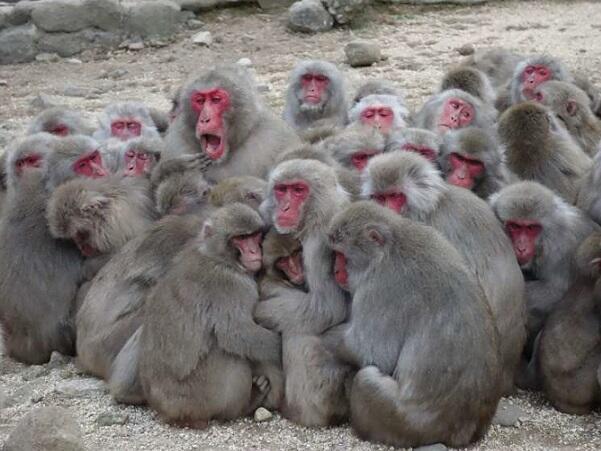Japanese macaques form "huddles" by pressing together with other group members to keep warm during the winter cold. Shintaro Ishizuka, a member of Kyoto University's Primate Research Institute, published findings that in huddles of monkeys in Choshikei Monkey Park, Shodoshima Island in Kagawa Prefecture, the higher ranked the male, the closer to the middle of the huddle they were and the more fellow monkeys they were in contact with. This was based on analysis of male rank, location in huddle and number of adjacent monkeys, seen in 100 photographs of monkey huddles. It was found that higher-ranked male Japanese macaques were more efficient at dealing with cold conditions. The findings, published in the online edition of international journal Behavioural Processes, are expected to lead to better understanding of the communal life and behaviors of animals.

Wild animals are known to have a range of cold-avoiding behaviors. The Emperor penguin, for instance, gathers in huddles of hundreds to ward off the cold. The Japanese macaques of Jigokudani Yaen-koen in Nagano bathe in hot springs. Among sociable animals that form stable groups with general membership, group hierarchy is connected to opportunities to obtain resources, as well as volume of resources. Japanese macaque groups have very strict hierarchies, and it is reported that high-ranking females bathe more frequently. As cold stress reduces immunity and biological function, it is expected that dominant animals would acquire more warmth. On the other hand, little was known about the effect of superior rank on cold-prevention behaviors or the amount of warmth they provide.
This was the motivation for the study by Ishizuka of monkey groups living around Choshikei which form giant huddles.
The macaques typically form huddles of up to 20, but on Awajishima and Shodoshima islands, they form giant huddles of over 50. On Shodoshima in particular, groups of over 100 have been observed.
The study was conducted with a group of around 200 monkeys in the nature park in Tonosho, Shodoshima, an island of the Inland Sea in Kagawa Prefecture. The group was made up of six males and the rest, females. The males were identified in the hierarchy from first to sixth using a peanut test. Photos of monkey huddles were taken in rapid succession during the winter of 2017 (December 1-29). From 100 photos of the huddles, size (number of monkeys) and air temperature were recorded. Monkeys in the park are used to the presence of humans, but a distance of 2-3 meters was maintained by the photographers.
Of the monkey huddle images, analysis was done of 56 huddles made up of 21 monkeys or more, and from which the position of the males (inside or outside) and those they were touching could be ascertained. The presence of the sixth-ranked male in the huddles could not be confirmed and he was therefore excluded from the study.
The study found that the rate of the male monkeys from first to fifth rank taking up the inner part of the huddle was 63% for the first, 41.7% for the second, 14.3% for the third, 33.3% for the fourth and 0% for the fifth-ranked male.
When it came to the number of bodies in contact with the top five males in the 100-monkey huddle, the no.1 monkey was in contact with 5.47 of his group, the second 3.63 others, the third 3.17 others, the fourth 3.47 others and the fifth 3.16 other monkeys. The giant 100-monkey huddle contained as many as three male monkeys, but in no cases were males in contact with one another.
From this fact it was clear that the higher-ranked the male, the higher priority they had for taking their place within the huddle. Many actions by the no. 1 male to jump into the huddle were observed, sometimes even chasing out lower-ranked males. These behaviors are likely to allow high-ranking males to efficiently escape the cold.
Due to the lack of female rank or family lineage data for macaques in the park, the team will conduct further study of their influence as well as attempting to measure heat using a thermo-camera.
This article has been translated by JST with permission from The Science News Ltd.(https://sci-news.co.jp/). Unauthorized reproduction of the article and photographs is prohibited.




